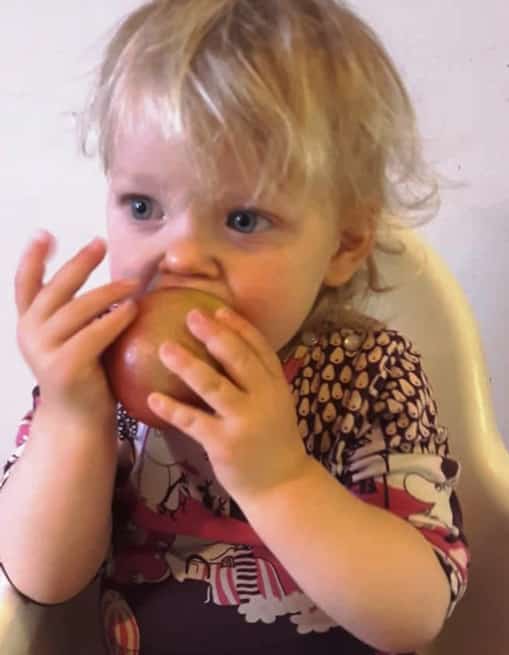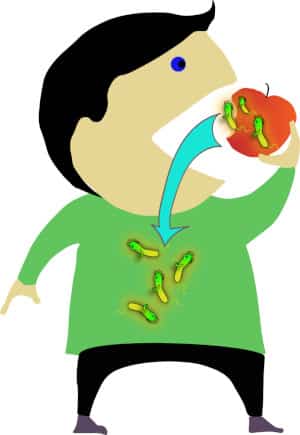„Apfelmikrobiom“ – Das Projekt:
Apple Microbiome: Research and complex analysis for our health
Our food not only determines our health directly through its nutrient composition, it serves at the same time as an important source of useful microorganisms which in turn affect our own individual microbial community (the microbiome). The microbiomes of our foods are, however, largely unknown. With the aid of microbiological and molecular biology, and microscopic analyzes, we are investigating the diversity within microbial communities in biologically and conventionally grown, healthy and disease-prone apples.

Students who were selected to participate in our investigative scientific work were tasked with trying to find out specifically what types and in what quantities microorganisms found within an apple can be considered useful or potentially pathogenic for humans. Microbiological research also enabled us to search for so-called biocontrol organisms which can counteract significant apple diseases and thus contribute to sustainable agriculture.
Our interdisciplinary project was designed specifically to successfully engage student interest, to stimulate cross-disciplinary learning that is scientifically, technically and artistically oriented. Our goal was to try and improve the prevailing (false) associations surrounding microorganisms not only amongst young people directly involved in the project but also in the general public sphere.
The creative interpretation of microbial forms began by capturing real life confocal laser microscopy images which inspired to the design of the wooden sculptures generated by the project dissemination coordinator and sculptor Timothy Mark with the assistance from students groups from several participating school in Graz. The sculptures allow the general public to experience the stunning and fantastical world of microorganisms, to touch them, move around them, climb, and even dance with them on a human scale. Sculptural modelling of microorganisms strengthened and excited public and media interest in microbiology, and facilitated a broader participation of student groups who were involved in the simultaneous public presentation of both scientific results and two- and three-dimensional artworks.
Summary of the Results:
The “Apple microbiome” project began in 2017 and will be concluded by the end of August, 2019. We have had an excellent response from publishers of both scientific journals and the popular press. 
The results of the first scientific study published by Frontiers in Microbiology were cited over 150 times by popular newspapers and blogs and the study is now In the top 5% of all research outputs scored by Altmetric. We were cited by The Guardian and Spektrum! Please read more about our scientific results at https://apfelmikrobiom.tugraz.at/ergebnisse/
The science inspired art events, “Ecoart days”, took place in the summer of 2018 and recently in June of 2019 in the Botanic Gardens of Graz. These events were the focal points of the dissemination aspect of our project, and were enjoyed by multiple participating school groups, Botanic Garden visitors, and the general public.
On the whole, we are very pleased with the positive outcomes of the project, the large dissemination of our scientific results and the success of our sculpture modeling outcomes.

Kunst als Schnittstelle zwischen Wissenschaft und Schule
Im Rahmen des Apfelmikrobiom-Projektes untersuchen SchülerInnen in Zusammenarbeit mit WissenschaftlerInnen der Technischen Universität Graz das Mikrobiom des Apfels. Die Untersuchungen sollen zu neuen Erkenntnissen und zu einem Umdenken unserer Beziehung mit Mikroorganismen führen. Ziel ist eine wissenschaftliche Veröffentlichung über die Zusammensetzungen des Mikrobioms des Apfels, sowie die Entwicklung einer neuen, nachhaltigen Methode der Lagerhaltung für Äpfel und einer umweltfreundliche Bekämpfung der Apfelkrankheiten.
Im Anschluss findet eine niederschwellige Wissensvermittlung des Themenkomplexes mittels verschiedenartiger künstlerischer Darstellung im schulischen und öffentlichen Raum statt. Die wissenschaftlichen und kreativen Ergebnisse werden in sogenannten „EcoArt Days“ im Rahmen mehrtägiger Ausstellungen der Öffentlichkeit präsentiert und in Social Media dokumentiert und verbreitet.
Somit stellt das Projekt ein innovatives Lehrkonzept dar, indem die kreative Arbeit der SchülerInnen als Schnittstelle zwischen Schule und Wissenschaft dient und eine ideale Plattform für den nachhaltigen Wissenstransfer bildet.
Was ist ein Mikrobiom?
Neueste Forschungsergebnisse konnten aufzeigen, dass Mikroorganismen die mit roh verzehrtem Gemüse und Früchten aufgenommen werden, einen positiven Einfluss auf die menschliche Gesundheit haben.
Die Erforschung der Mikrobiome von Nahrungsmitteln wurde diesbezüglich als Forschungsschwerpunkt Nummer eins in der internationalen Mikrobiomforschung klassifiziert.
Nicht nur der Mensch als Konsument, sondern auch die Vitalität der Pflanze wird grundlegend durch ihr inhärentes Mikrobiom beeinflusst.
In Zusammenarbeit mit Sparkling Science, einem vom Bundesministerium für Wissenschaft, Forschung und Wirtschaft geförderten Programm das Jugendlichen einen Einblick in universitäre Forschung gewährt, wird das Mikrobiom des Apfels untersucht, über dessen Zusammensetzung bisher noch wenig bekannt ist.
Gemeinsam mit Schülern aus drei Grazer Schulen, werden die Mikrobiome von gesunden und kranken, sowie biologisch und konventionell gezüchteten Äpfeln miteinander verglichen.
Welchen potentiellen Einfluss der Apfel dabei auf die menschliche Gesundheit haben kann, soll aufgezeigt werden.
Die Bekämpfung von Apfelpathogenen wie Apfelschorf und Lagerfäule ist bislang nur durch den Einsatz von Pestiziden möglich, was massive ökonomische Probleme für die biologische Landwirtschaft mit sich bringt. Ein weiterer Forschungsschwerpunkt des Projekts ist es daher, nachhaltige und ökologisch sinnvolle Möglichkeiten zu modellieren, um diese Apfelkrankheiten einzudämmen sowie gemeinsam mit industriellen Projektpartnern Apfellagerungsbedingungen zu optimieren.



